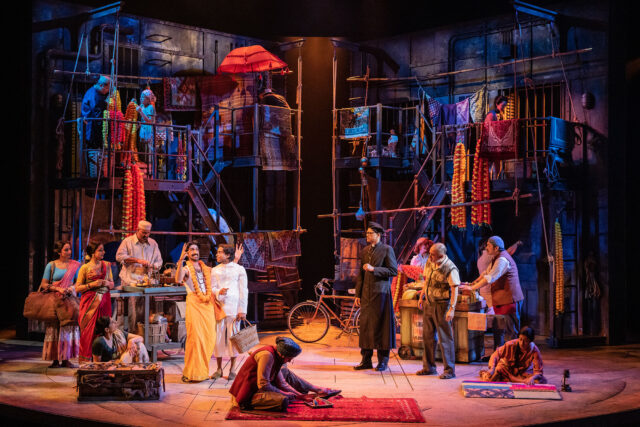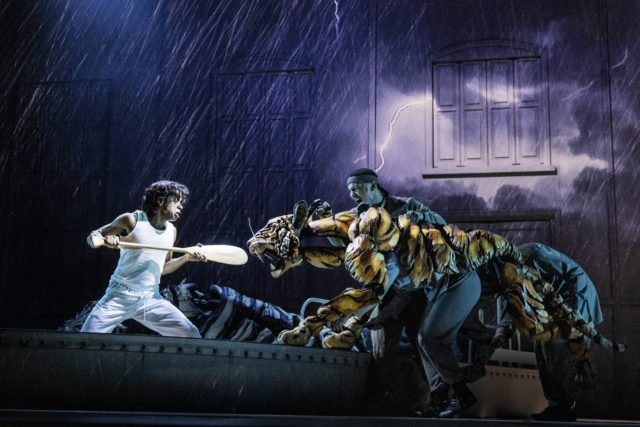
Life of Pi explores religion as a family tries to make a better life away from home (photo by Matthew Murphy & Evan Zimmerman for MurphyMade)
LIFE OF PI
Schoenfeld Theatre
236 West Forty-Fifth St. between Broadway & Eighth Aves.
Tuesday – Sunday through September 3, $58-$244
lifeofpibway.com
On the way to my seat in the Schoenfeld Theatre to see Life of Pi, I passed by two women who had purse dogs with them, small pooches who almost, but not quite, could disappear into their laps. Maybe they were emotional support pets (really?), or maybe it’s part of the growing trend of dog owners bringing their animals with them everywhere they go, although I can’t remember ever having seen any beast other than guide dogs in a Broadway house before. But as it turned out, the two pups were quiet and respectful throughout the 130-minute play (including intermission), unbothered by the wild theatrics involving animals happening onstage.
Canadian author Yann Martel’s 2001 award-winning bestseller was first adapted into a 2012 film that was nominated for eleven Oscars, winning four, for Best Director (Ang Lee), Best Cinematography (Claudio Miranda), Best Original Score (Mychael Danna), and Best Visual Effects.
The play, adapted by Lolita Chakrabarti and directed by Max Webster, grabbed Best Play honors at the 2022 Olivier Awards, but, after seeing it on Broadway, I cannot figure out why.
The story is told by seventeen-year-old Piscine Molitor Patel (Hiran Abeysekera, replaced by Adi Dixit on Tuesdays), known as Pi, who has survived a terrible tragedy on the high seas. It’s 1978, and he’s recovering in a hospital in Mexico, being cared for by a Spanish-speaking nurse (Mahira Kakkar).
One day he’s visited by Mr. Okamoto (Daisuke Tsuji), from the Japanese Ministry of Transport, and Lulu Chen (Kirstin Louie), from the Canadian Embassy; the former is compiling the official report of the incident, primarily for insurance purposes, while the latter is there to protect Pi’s interests. The tale unfolds in a series of flashbacks told from Pi’s point of view, starting with his life in Pondicherry in India, where his family ran a zoo: his strict father, Baba (Rajesh Bose), his warmhearted mother, Amma (Kakkar), and his older sister, Rani (Sonya Venugopal). The clan includes Pi’s aunt, Mrs. Biology-Kumar (Salma Qarnain), who teaches the siblings about the importance of the natural world, and family friend Mamaji (Sathya Sridharan), who taught Pi how to swim (which comes in handy when you’re lost in the middle of the ocean). Among the animals in the zoo are Richard Parker the Royal Bengal tiger, Orange Juice the orangutan, a zebra, and a hyena.

Pi (Hiran Abeysekera) battles Richard Parker the tiger in Life of Pi (photo by Matthew Murphy & Evan Zimmerman for MurphyMade)
A key exchange early on sets the tone for the show.
Pi: Are you a religious man, Mr. Okamoto?
Mr. Okamoto: That’s a rather personal question . . . erm . . . no . . . not really . . .
Pi: Why not?
Mr. Okamoto: Well faith is . . . erm . . . not something that . . .
Pi: Many of us lose God along life’s way.
Mr. Okamoto: I didn’t lose God.
Pi: Then what do you believe?
Mr. Okamoto: Mr. Patel, I’d really like to . . .
Pi: Please.
Mr. Okamoto: I’ve never been a believer. Religion is a habit rather than a truth. A crutch in times of need.
Pi: So you’re an atheist.
Mr. Okamoto: Yes.
Pi: I respect that. Atheists are believers of a different faith. It’s agnostics I don’t understand. They don’t commit to anything. Choosing doubt as a philosophy of life is like choosing immobility as a mode of transport . . . I will tell you everything, Mr. Okamoto . . . because my story will make you believe in God.
Mr. Okamoto is essentially a fictional representation of the audience, many of whom might not be strongly connected to any organizational faith. The play feels like an evangelical attempt to push religion — any religion — on theatergoers. One afternoon in the market, Pi meets with Father Martin (Avery Glymph) of the Catholic church, Zaida Khan (Qarnain) from a Hindu temple, and Pandit-ji (Sridharan) of a Muslim mosque, testing all three denominations. “I just want to love God,” he tells his sister and parents.
Seeking a better life in Canada, the family boards a cargo ship with their animals, but a terrible storm leaves Pi on a large lifeboat with a few of the animals. It’s like a flood of biblical proportions has wiped out humanity, except for the ever-faithful Pi, who is cast adrift with the hyena, Orange Juice, the zebra, and Richard Parker. When Richard Parker attacks him, Pi ecumenically calls out, “Jesus, Mary, and Joseph. Rama, Sita, Durga, and Shiva.”
While at sea, Pi imagines he is visited by his relatives who were killed in the storm, and from time to time Admiral Jackson (Glymph) stops by to offer survival tips. As days extend to weeks and months, Pi fights hunger as he and Richard Parker struggle to stay alive, talking to each other as they face the unknown.
Back in the frame story, Mr. Okamoto finds Pi’s account frankly unbelievable, demanding the truth so he can close the case and absolve both Japan and the shipping company of liability, but when Pi offers a different version of events, the government functionary has to reevaluate his decision. “Which is the better story?” Pi asks him, as if trying to sell him a Bible.
The stagecraft of Life of Pi can be breathtaking when the narrative avoids going overboard. Numerous people operate the animal puppets, with one of the puppeteers or actors providing the voice; it won’t take long before you stop thinking of Richard Parker as a puppet and more of a vicious threat who can tear Pi to bits. The storm scene is truly scary. The ensemble playfully depicts fish swimming in the ocean or butterflies flitting past, accompanied by projections that further the illusions.
The technical team deserves mountains of kudos: The quickly morphing, magical set and effective costumes are by Tim Hatley, the projections by Andrzej Goulding, the puppet design by Nick Barnes and Finn Caldwell, the lighting by Tim Lutkin, and the sound by Carolyn Downing, all of whom have been nominated for Tonys. Nikki Calonge, Fred Davis, Rowan Ian Seamus Magee, Jonathan David Martin, Betsy Rosen, Celia Mei Rubin, Scarlet Wilderink, and Andrew Wilson operate the puppets, with Richard Parker voiced by Brian Thomas Abraham, who also plays the cook, and Orange Juice voiced by Kakkar; the original music is by Andrew T. Mackay.
Abeysekera makes a strong impression in the lead role, able to stand out amid all the scintillating puppetry, but his performance cannot make the audience forget about the overwhelming religious message.
On the way out, I saw those two dogs again; they looked exactly the same as they did on my way in, unchanged by the events of the past two hours. One of the pups let out a big yawn; I can’t say I blame him.